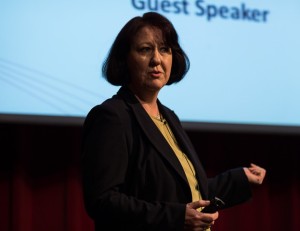 I have been attending a great many healthcare conferences of late—to the extent that they have rather merged into one.
I have been attending a great many healthcare conferences of late—to the extent that they have rather merged into one.
A common thread running through all of them has been the claims of varying degrees of co-production and patient centredness. As a long term patient, who has spent many a year occupying the “patient corner” (near the door) at various events, I am always keen to see how this plays out in reality.
I was on the “People’s Panel” at a major health conference recently. We were certainly there. We even had seats reserved at each session right at the front, just in case it was not obvious that there “they” were now present in the room full of “us.” We were lauded on a constant basis for our presence. If this is the equal partnership that the rhetoric says we now have, why is there a need to point out our presence so loudly? Were we actually now working in partnership in a tangible sense, or just occupying a more palatably decorated patient box? The overall feeling was one of unease.
There was no such feeling at last week’s National Institute for Health Research (NIHR) INVOLVE conference, aptly entitled “Changing Landscapes,” which brought together people with a common interest in public involvement in the NHS, public health, and social care research.
An early observation of mine was the lack of job titles on name badges. This seemingly minor detail spoke volumes. We were all there because we had an interest in seeing health research happen in a way that results in improvement for all of us. We each had a unique set of skills and experiences to contribute to making this happen.
This spirit of parity of knowledge and expertise prevailed throughout. I gave up working out who were the patients, who were researchers, who were clinicians. In truth, we were very often all of the above, and more to the extent that it seemed to be happening naturally, as a given and not something anyone felt the need to put a box around or trumpet from the rooftops.
My own presence there was part of my longstanding connection with NIHR’s Collaborative for Leadership in Applied Health Research and Care (CLAHRC), northwest London—one of 13 collaboratives nationally where academics, healthcare professionals, and patients work in partnership to see research translated into better outcomes. CLAHRC helped me access training to be more effective as a patient leader.
As CLAHRC fellow, I worked and learned alongside clinicians and other healthcare professionals to develop my leadership skills and learn about quality improvement methodology. This helped me reconnect with skills that had been obscured by the long term experience of being passively engaged with the system, and I developed new knowledge on the way. It enabled me to go on to become the first patient leader to complete the NHS Leadership Academy Mary Seacole Programme, which has just gained me a Post Graduate Certificate in healthcare leadership.
I was changed by working in equal partnership with professionals, and my professional colleagues likewise were also changed in turn. The common ground where we meet in the middle, where there is a synthesis of all the skills and assets present in the room regardless of how these were obtained, is where the creativity, the potential, and the hope lies.
My workshop at NIHR INVOLVE, co-designed and co-delivered with my colleague Liz Evans from the CLAHRC team, was on precisely this. We described our “journey” along the continuum from passive patient to equal partnership in terms of the impact on both of us.
The process of creating our workshop was not delineated according to whose “job” it was, but simply by realising that we both held parts that could contribute to a better whole. I submitted the abstract, Liz helped design the slides, and we divided up the presentation duties—which one of us was the “patient” and which was the “professional” was only relevant in terms of the unique perspective we each brought to the subject matter.
At NIHR INVOLVE we were not unusual. As the research team from southwest London and St George’s NHS Trust put it in their presentation, “we’re not ‘service user researchers’ or ‘academic researchers’ now, we’re just a team of researchers,” each with the benefit of different lenses through which to view the work.
The view across the landscape seems much more beautiful when seen through a broader lens. I’ve always preferred to see life through a kaleidoscope.
“The voyage of discovery is not in seeking new landscapes but in having new eyes.” (Proust)
Alison Cameron ran international development projects for 10 years, but her career was cut short when she was diagnosed with post-traumatic stress disorder after her colleagues were killed in the course of her work. She is fellow of the Collaborative for Leadership in Applied Health Research and Care (CLAHRC), northwest London, and the sole “patient” on the NHS Leadership Academy. She now works with NHS and social care organisations on how to work in genuine partnership by sharing power with those on the receiving end.
Competing interests: I declare that I have read and understood BMJ policy on declaration of interests and I have no relevant interests to declare.
